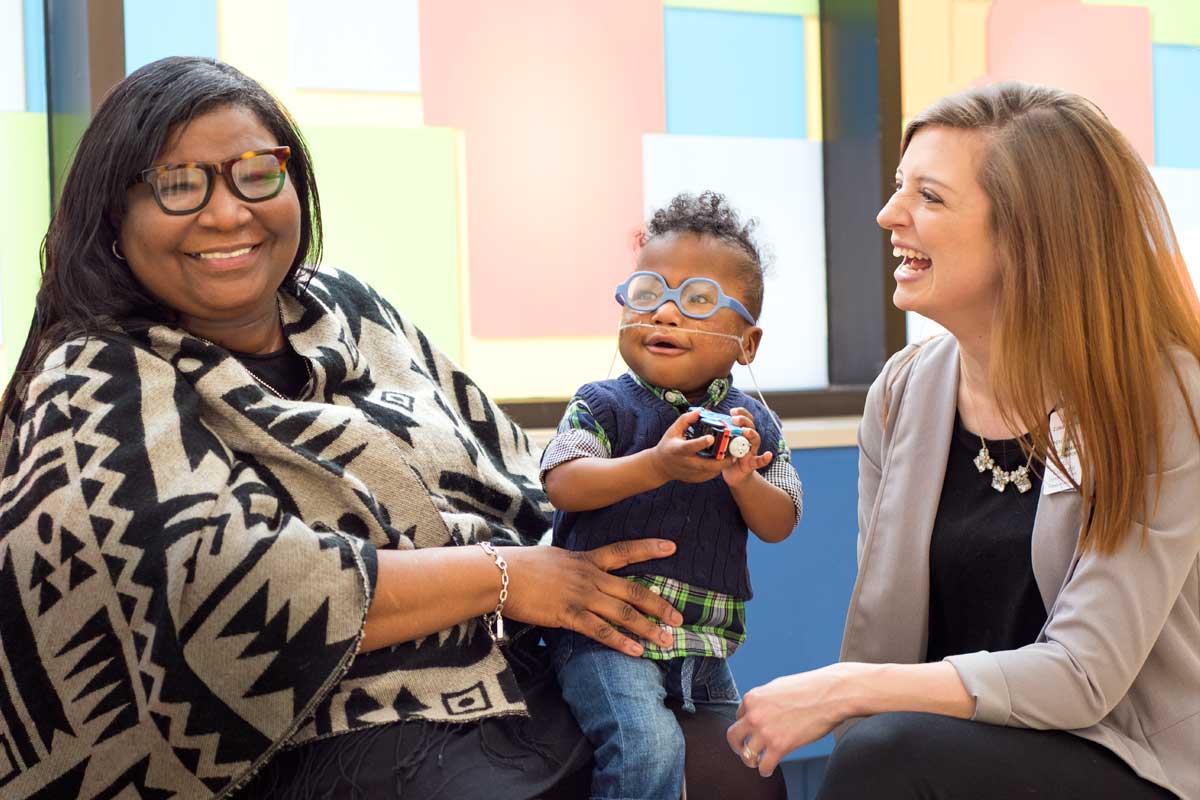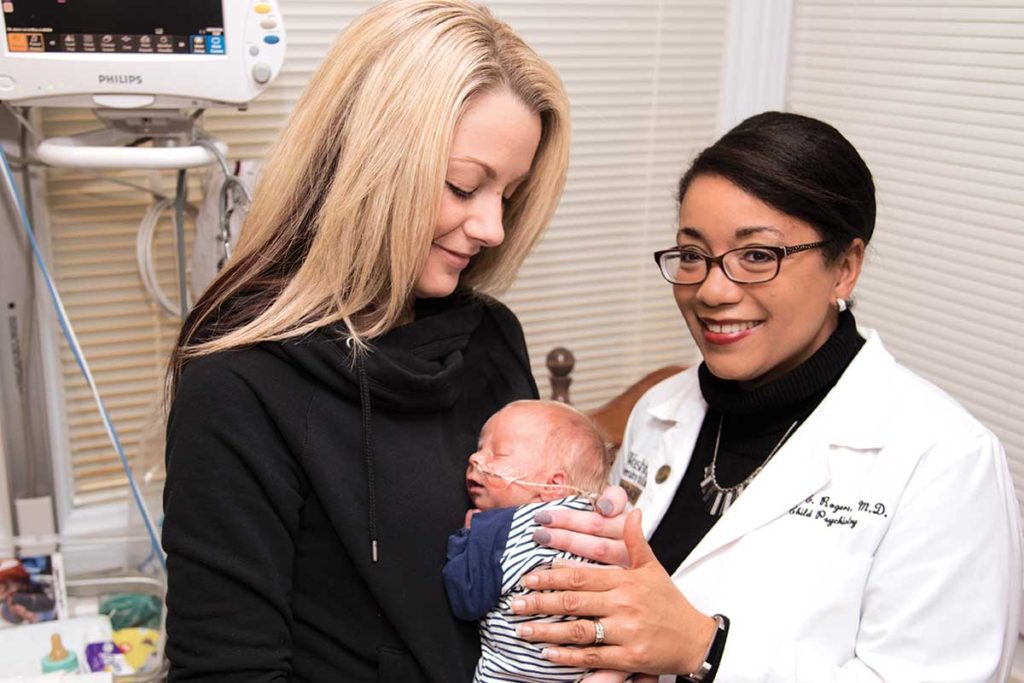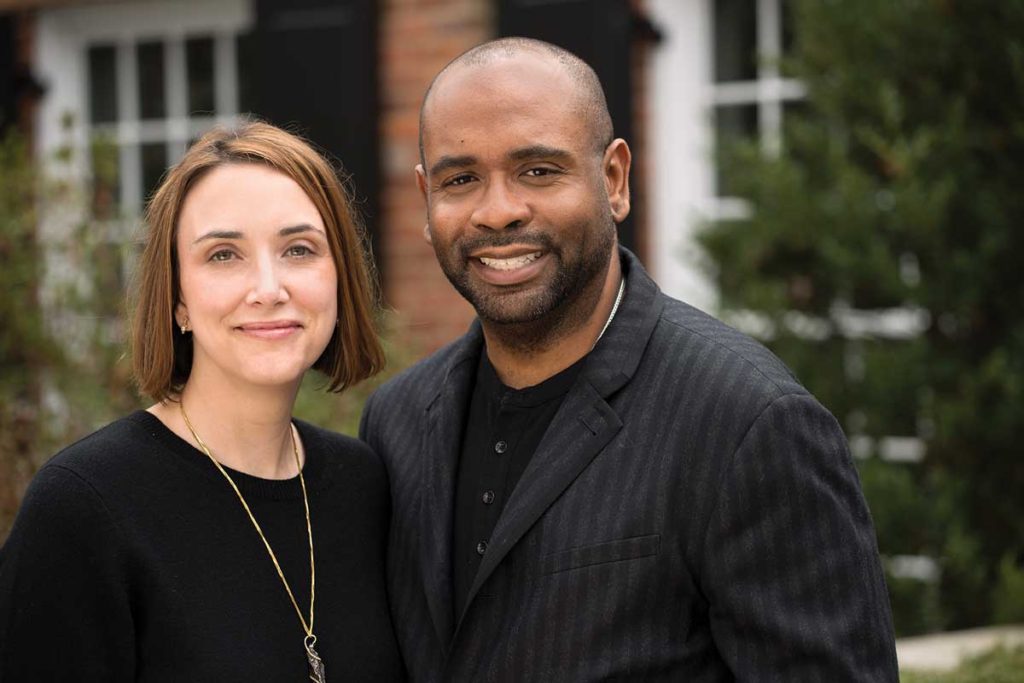
From left, Robin Torrence-Webber with her son, Baby Ray, and therapist Anna Constantino-Pettit, MSW ‘14.
Robin Torrence-Webber was thrilled when, at 37, she became pregnant with her second child. But a diagnosis of preeclampsia and an emergency caesarian section at 23 weeks presented a difficult reality. Babies generally are not considered medically viable before 24 weeks of gestation.
She woke to learn that her newborn son, Baby Ray Webber III, who weighed just 1 pound, 1.6 ounces, had been taken from Barnes-Jewish Hospital to St. Louis Children’s Hospital, where doctors were trying to save his life.
Three days later, Torrence-Webber finally got to see her baby. “He was so little,” she said. “He could literally fit in the palm of my hand.” Torrence-Webber spent days and nights at the neonatal intensive care unit (NICU), not knowing if her son would survive.
While Ray clung to life, Torrence-Webber grew more anxious and depressed. She was torn between taking care of her daughter at home and visiting Ray in the NICU.
“I was having anxiety attacks,” she said. “I couldn’t sleep. I couldn’t function.”
Torrence-Webber sought help after NICU staff told her about the Perinatal Behavioral Health Service (PBHS) at the School of Medicine. The PBHS offers counseling and psychiatric care for pregnant women and new mothers with anxiety or depression.
Physical, emotional toll on baby
Fifteen percent of women experience perinatal anxiety or depression. Although women with a history of psychiatric disorders are predisposed to the condition, it can strike anyone. For women with babies in the NICU, the number jumps to 40 percent. Parents of babies in the NICU undergo enormous stress and often face unaddressed mental health issues.
Cynthia Rogers, MD, one of the PBHS founders, determined that by setting up services to treat these mothers, she could improve the outcomes of their children.

Cynthia Rogers, MD, right, co-founder of the Perinatal Behavioral Health Service, discusses the progress of infant Tycen Reisch with his mother, Stacy Reisch.
Rogers, an assistant professor of child psychiatry, has studied how exposure to a parent with behavioral health issues affects brain development in young children, increasing the likelihood of childhood psychiatric disorders.
Left untreated, such issues can affect a child physically and emotionally, beginning in the womb. Studies suggest that the mother’s physiology during pregnancy can change the baby’s physiology.
Elevated levels of the stress hormone cortisol, common in depressed patients, are believed to affect development of a part of the brain called the amygdala. Other research has revealed differences in the thickness of the cerebral cortex between infants of depressed mothers and a control group. Behaviorally, such infants are at increased risk for fussiness, failure to thrive, and developmental delay at 1 year of age.
Mental health issues also affect how moms are able to care for and interact with their children. “Mothers with untreated mood disorders are less likely to engage in a host of nurturing behaviors proven to promote healthy development and attachment, including breastfeeding, being emotionally responsive and affectionate, reading,
and singing to babies,” Rogers said.
Moreover, studies have shown that children whose parents have untreated mental health issues are at much greater risk to experience abuse and neglect. As they grow, these children are more likely to develop mental issues such as depression and attention deficit/hyperactivity disorder.
“When you don’t treat moms, you see a significant impact on child mental health, academic performance and many other outcomes,” Rogers said.
Serving a critical need
Rogers began treating parents of NICU babies in 2010 — first by meeting them in the NICU, and later via a Children’s Hospital clinic. She realized, over time, that these families needed more help than she alone could provide.
As a child psychiatrist, Rogers’ schedule already was full. At the same time, Kelly Ross, MD, assistant professor of pediatrics, was searching for a way to help anxious and depressed mothers who had delivered babies at Barnes-Jewish.
Rogers and Ross joined forces to create the Perinatal Behavioral Health Service in 2012. They chose the term “perinatal” rather than “postpartum” because the PBHS works with both new mothers and pregnant women, who are also at increased risk for depression.
Supported by grants and private philanthropy, the PBHS is a team of social workers, psychiatrists and psychologists who offer testing, counseling, medication and case management.
The service screens women for anxiety, depression and trauma at multiple locations, including the maternity floors at Barnes-Jewish, the NICU at St. Louis Children’s Hospital, and the Obstetric Clinic at the Barnes-Jewish Center for Outpatient Health. The service also accepts community and self-referrals.
In Missouri, obstetrician-gynecologists commonly screen new mothers for depression at the six-week postpartum checkup. Because mental illness can affect a mother’s ability to bond, PBHS screenings take place as early as eight weeks of pregnancy — potentially improving those first mother-child interactions. Rogers said women need to understand that mental health issues, such as anxiety and depression, occur commonly in pregnancy and in those often-grueling months after bringing home a newborn.
Screening is particularly important because, all too often, mothers of newborns are afraid to admit they are unhappy.
“Everybody believes that the experience of childbirth is supposed to be an ecstatic experience,” Rogers said. “So when that doesn’t happen, women feel that there is something wrong with them, or that they’re bad mothers.”
Learning to adjust
Torrence-Webber developed coping skills through weekly sessions in the NICU with PBHS therapist Anna Constantino-Pettit, MSW ’14. “Anna lifted my spirits,” she said.
Talking to Constantino-Pettit helped ease Torrence-Webber’s guilt as she split her time between Baby Ray and family at home. At her therapist’s suggestion, Torrence-Webber began meditating and writing in a journal. Constantino-Pettit also taught Torrence-Webber to be mindful of situations that trigger negative feelings.
Perhaps most importantly, Constantino-Pettit provided Torrence-Webber a safe space to talk about her difficulties without being judged.
At 8 months of age, Baby Ray was ready to come home. Despite much progress, his homecoming presented new challenges. “I went from having 24-hour nursing care to taking care of a baby who’s on oxygen and a heart monitor,” Torrence-Webber said.
Once again, Torrence-Webber realized she needed help to adjust to the new routine. She and Constantino-Pettit resumed their sessions. Today, Torrence-Webber has successfully adjusted to caring for Baby Ray.
Hundreds of families have been helped through the PBHS, and Rogers remains passionate about its mission.
“Seeing parents who, even after a difficult start, are raising emotionally healthy children is the most worthwhile outcome I can think of,” she said.
![]()
Gift strengthens services for high-risk families
One St. Louis couple with firsthand knowledge of postpartum depression is boosting the efforts of the Perinatal Behavioral Health Service (PBHS). Mary Steward and David Steward II are committed to helping mothers and babies get off to the best possible start.

Mary and David Steward
With a generous gift from the Steward Family Foundation, the couple created the Steward Family Perinatal Behavioral Health Service Fund to provide necessary support. The gift helps high-risk families that might not otherwise have access to mental health resources. At Barnes-Jewish Hospital, for example, many expectant moms are uninsured or on Medicaid.
The Stewards learned about the PBHS while touring the medical school. They immediately were struck by how early intervention can translate into lifelong benefits for moms and their kids.
“We like the proactive aspect of the service,” said Mary Steward. “It’s not waiting around for something awful to happen, but getting women help on the front end.
“To not allow someone to be lifted out of that state and have a great experience with her child because she doesn’t have access to proper medical care or prescriptions — we just can’t allow that to happen,” she added.
The subject hits close to home: Mary Steward recalls the exhaustion and isolation she felt several weeks after the birth of her first child. Whether her depression was caused by hormonal changes, being cooped up during a bleak winter, or the transition to full-time motherhood, she said she knew that something was wrong.
“It was apparent that it wasn’t just the normal ‘I just had a baby and I’m a little tired from getting up in the middle of the night,’” Mary Steward said. She confided in loved ones, who encouraged her to seek medical care. The treatment was effective, and, in talking openly about the problem, the Stewards realized that so many others are affected.
“We hope that our support will help make programs like this the standard of care,” David Steward II said. “It’s so important that women across cultures realize that this is a common condition that can be treated.”
Published in the Spring 2017 issue





 Share
Share Tweet
Tweet Email
Email